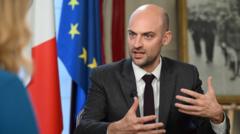French Foreign Minister Jean-Noël Barrot has stated unequivocally that France will support Ukraine without imposing any "red lines," emphasizing an open commitment to military aid amid an intensifying conflict with Russia. In an exclusive interview with BBC's Laura Kuenssberg, Barrot acknowledged Ukraine’s right to use French long-range missiles in its defensive operations, but refrained from confirming whether French weaponry has already been deployed against Russian targets.
The remarks come at a pivotal moment following the launch of US and UK long-range missiles into Russia for the first time, highlighting the significant shifts in the support Western allies are willing to extend to Ukraine. Barrot remarked, “We will support Ukraine as intensely and as long as necessary,” stressing that every advance by the Russian military is a threat knocking at Europe’s door.
Barrot also hinted at the possibility of allowing Ukraine to join NATO, a move President Volodymyr Zelensky has voiced interest in. “We are open to extending an invitation... and working with friends and allies to bring Ukraine closer to our positions,” he stated. This openness reflects a growing recognition among Western countries that increased military aid and potential NATO membership may be crucial in countering the Russian threat.
In light of an escalation in hostilities, which included Russia’s recent missile tests and President Vladimir Putin's provocative rhetoric, Barrot's comments underscore a critical juncture for Ukraine and its allies. He pointed out that Western nations should embrace their responsibilities without setting limits on their support, asserting, “We do not discard any option,” including the potential deployment of French troops if necessary.
As discussions among Western nations continue, there are calls for increased defense spending. With the pressures of ongoing financial constraints in Europe, some sources are advocating for a significant boost in military budgeting to better equip Ukraine for sustained defense against Russia. However, the imminent reality of funding escalations remains complicated, with various governments already facing budgetary challenges.
Furthermore, as the geopolitical landscape unfolds, the prospect of a change in US leadership brought on by the potential return of Donald Trump raises questions about the future of American support for Ukraine. Some analysts point out that Russia may be attempting to leverage this uncertainty to shift dynamics in their favor.
Recognizing the gravity of the circumstances, Barrot and various UK government sources advocate for sustained military and monetary support to ensure Ukraine can withstand ongoing pressure from Russia, which also has strategic alliances in places like North Korea and Iran. The consensus among officials is clear: understanding and preparing for Russia's persistent aggression will be paramount in the coming years.
As Europe stands united against the underlying threat, the road ahead for Ukraine remains fraught with challenges, while discussions on what compromises might emerge in peace negotiations continue to evolve within the political landscape.
















